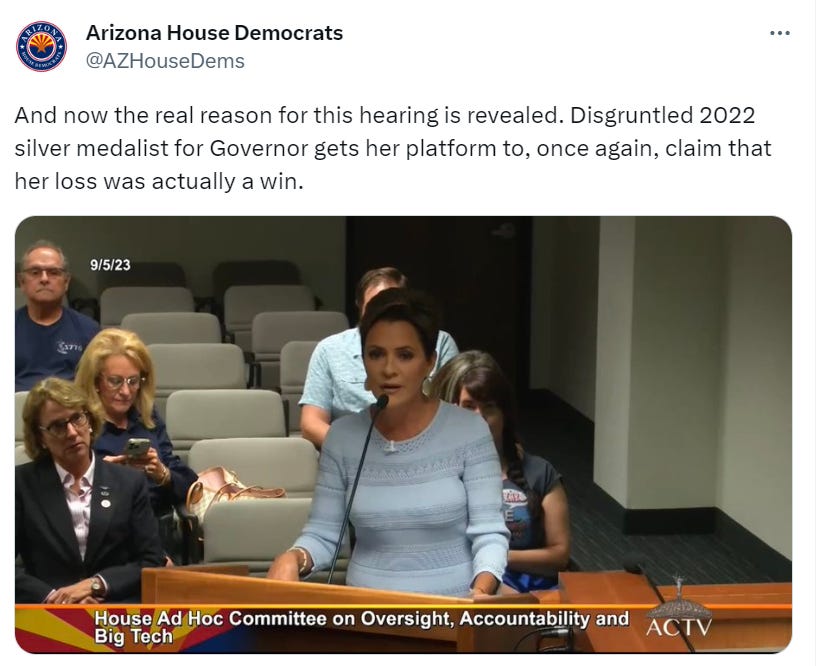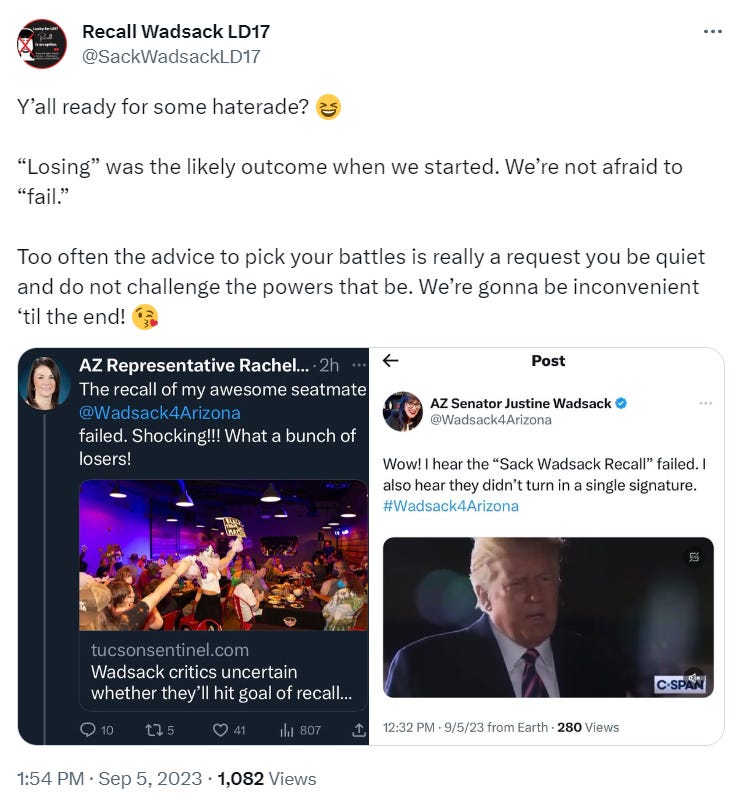The Daily Agenda: It was mind control all along
Kari comes to the Capitol ... As long as Tom isn't tutoring personally ... And we preferred "talk to the hand."
It wasn’t the rigged voting machines, the fraudulent bamboo ballots, the drop boxes, Splunk logs, Sharpies or even 2,000 mules that stole the 2022 election from Kari Lake and installed Katie Hobbs as Arizona’s governor instead.
It was a “mind control machine” that did Lake in, according to the latest election denier that lawmakers invited to present at the Capitol yesterday.
And the name of that mind control machine is Google.
“Kari Lake would have won — hands down, absolutely guaranteed — if you took Google out of the picture,” pop-psychologist Robert Epstein, a longtime Google foe and self-proclaimed “whistleblower,” told an ad hoc committee of lawmakers tasked with investigating big tech’s censorship and election-rigging yesterday.
Lake and her ilk, of course, jumped on the latest conspiracy alleging she should be Arizona’s real governor, pointing to the former Harvard professor’s research that claims Google has instituted a massive vote-influencing operation designed to help Democrats. Lake even made a personal appearance at the end to hammer home that she is, indeed, the rightful governor.
But Epstein’s experiments basically amount to creating a fake Google and filling it with negative results about one candidate or the other, then asking participants to scour the fake search engine for information and report back their views about the candidates after reading up on them.
His years of research have unearthed a fascinating, previously unknown feature of human behavior: If you tell people bad things about a candidate, they’re less likely to vote for that candidate. Moderate Republicans, he said, are most susceptible to this one weird psychological trick, but anyone can be coerced into changing their minds based on learning new facts, he told the committee ominously.
We’d call that making your own choices about candidates based on the information at hand, but Epstein has other terms he prefers, like “vote shifting” and “indoctrination” from Google’s “mind control machine.” Only “stupid” people still google, he told lawmakers.
And not only did Google shift “tens of millions of votes” to Democrats in 2022, but it’s also “engaging in systematic indoctrination of our kids,” Epstein said, by having Google Docs offer politically correct language if they type something offensive.1 The horror!
In fact, it seems the only thing Google isn’t hiding from you is Epstein’s research — punch his name into the old mind control machine and you can find all his latest rants and accusations about the tech giant, along with the 1996 fitness book he co-authored with Lori Fetrick, AKA "Ice" from the hit 1990s TV show “American Gladiators.” (The book, unfortunately, appears to be out of print.)
Epstein claims that elections are essentially irrelevant nowadays because Google can just tell us how we’re going to vote anyway (which, if true, would seem to negate the idea that Google can sway elections — and would be some very valuable data that you’d think the company could sell to Nate Silver to help rehabilitate his reputation).
But, as you might expect, there are some very big holes in the one-time Harvard professor’s logic. For example, his entire argument hinges on the fact that negative stories about Donald Trump show up ahead of the positive stories about him on Google’s results. The thing is, there are a lot of negative stories about Trump. That could be because he was a terrible president who attempted to destroy American democracy as we know it, or it could be because the liberal media hates him. Either way, that’s not Google’s fault!
The New York Times does and should show up above the New York Post in search results. The Washington Times is not on par with the Washington Post, no matter how much Epstein thinks they should rank equally.
Reporters better than us and academics smarter than us have spent a lot of their valuable time debunking Epstein’s research on Google’s alleged election interference. We won’t bother to go down that rabbit hole, other than to say it is easily debunkable.
But even if you believe Epstein, his solution to the problem of Google rigging elections to benefit Democrats should raise some eyebrows. Epstein told Republican lawmakers that even with the power of Arizona laws and government at their disposal, they’ll never be able to stop Google from rigging elections against them. Government is too slow to keep up with big tech, he warned.
So what’s Epstein’s solution to the most pressing problem of our time? Fund his Google monitoring projects, of course.
Our team is making rapid progress on our election grifter #monitoring program. To help us protect our Republic from #grifters, please consider buying a generous subscription to the Arizona Agenda!
Lawmakers love election grifters. So don’t be surprised when you see them move taxpayer dollars toward Epstein’s cause cause next year.
Tutors for some!: Superintendent of Public Instruction Tom Horne is clawing back a bunch of federal COVID-19 money that his predecessor, Kathy Hoffman, had pledged to schools for various programs. Instead, he’s spending the funds on personal tutors — but the funds would only be enough to provide tutors to about 1-in-10 students who are failing standardized tests, per Capitol Media Services’ Howie Fischer’s math. Schools that couldn't prove to Horne that the federal funds were leading to student improvement saw their funds revoked to pay for the new tutor program.
Hear us out… short-term shelters?: The Fountain Hills City Council is “addressing homelessness” by making being homeless as close to illegal as possible. The city council voted to ban “urban camping” and “aggressive panhandling,” KJZZ’s Ignacio Ventura reports. Scottsdale is pushing for more limits on short-term rentals, and the Scottsdale Progress’ Tom Scanlon caught up with the city’s most ambitious cop (the guy who took on the Airbnb enforcement beat). And basically every city wants lawmakers to do more to address the problem, Jeremy Duda reports for Axios Phoenix.
Tucson did it first: As the Phoenix City Council prepares to legalize backyard casitas citywide to address the housing shortage, our sister ‘sletter, the Tucson Agenda, dives into the Old Pueblo’s two-year experiment with casitas. So far, less than 100 applications have even been submitted, and Tucson isn’t alone in finding small returns on the often-hyped policy solution.
Help us build a casita in Hank’s yard so we can solve the housing problem! Subscribe today!
Couchsurfing gone wrong: Peoria City Hall has been abuzz with drama and intrigue after city council members found out that vice-mayor Denette Dunn allowed a friend who is a registered sex offender to stay intermittently at her house without formally registering at her address, the Republic’s Taylor Seely writes. Republican activists set their sites on Dunn, though few turned out for Tuesday’s meeting. Dunn alleges her Republican colleagues are attacking her for her pro-LGBTQ+ stance. Several fellow councilmembers called on her to resign, but she has refused.
Free tuition works: Native American student enrollment spiked by nearly 50% at Northern Arizona University this year, breaking records, the Arizona Mirror’s Shondiin Silversmith reports. The increase is thanks in part to a new program that covers tuition for lower-income families or members of Arizona’s federally-recognized tribal nations. And Arizona Regent and former gubernatorial candidate Fred DuVal joined KJZZ’s “The Show” to talk about the state university system’s new charge to crank out as many doctors as possible, college sports and more.
Recalls are just theatrical press releases: The effort to “sack” freshman Republican Rep. Justine Wadsack predictably flopped after backers failed to get the nearly 31,000 valid signatures from registered voters in her district, Fischer reports.
Uber is the new mining company: Attorney General Kris Mayes announced she had started a new “worker protection unit” to investigate workers’ rights abuses, including charges like misclassifying employees as contractors, KTAR’s Brandon Gray reports. And for a dose of labor history, check out this piece about the copper miner strike of 1983 from Courthouse News’ Sam Ribakoff.
“It’s been 40 years since the strike started, but its effects still reverberate not only in Clifton but throughout the organized labor movement. That’s because of the lengths mining executives went to break the town's union,” Ribakoff writes.
If this amazing moon/cloud/jet photo from Arizona photographer Andrew McCarthy doesn’t just inspire some awe in your day, then you can warm your heart with this story about Minion, a Glendale dog who got lost 12(!) years ago and was recently reunited with his family. It appears Minion had been living with another family in the interim and got lost again.
Republican Rep. Alex Kolodin, who hosted today’s hearing on Google’s mind control abilities, has a new catchphrase for his critics.
If this is a feature of Google Docs, it’s not available on ours — we tested it.












"I'm being silenced!" declares man while speaking to sitting politicians and assembled media
With respect to AK's latest nonsense....just how many adolescent legislators are there in Arizona? GROW UP!